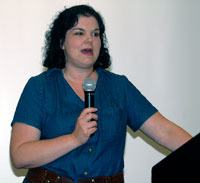MARYSVILLE — “When we talk about human trafficking, we hear people say that it doesn’t happen here,” said Dusty Olson, advocate and volunteer coordinator for the Providence Intervention Center for Assault and Abuse. “But these are girls from Marysville, Lake Stevens and Everett who are being recruited and exploited.”
Olson joined FBI Special Agent Derik Stone and Sarah Sweeney, director of “Not For Sale” of Washington, in addressing the Marysville Chapter of Soroptimist International on Sept. 22 to discuss domestic minor sex trafficking, the commercial sexual exploitation of underage children in America.
Olson became aware of the problem of local human trafficking through years of working with sexual assault victims, and as she addressed an audience that included Marysville Mayor Jon Nehring and Marysville School District Superintendent Dr. Larry Nyland, she noted the unique difficulties of trying to aid such exploited children.
“We don’t refer to them as juvenile prostitutes, because that implies the false idea that they have a choice,” Olson said. “They’re prostituted children, because it’s what’s happened to them, not who they are.”
At the same time, Olson and Stone acknowledged that such children are conditioned by their exploiters to see themselves as having chosen their lives, to the point that they’ll often lie to protect their exploiters and remain with them.
“A pimp senses what a child is vulnerable to — what they need that they’re not getting, whether it’s a father figure or a romantic relationship — and then sells them the dream,” Olson said. “They genuinely believe they have free will and will do anything to keep the dependency that their pimps have established. It’s similar to domestic violence relationships.”
Young girls tend to be exploited much more than young boys in this fashion, with most exploited girls entering a life of prostitution between the ages of 12 and 14, and only living to an average age of 20 due to the violence they experience.
Stone works as part of the Bureau’s “Innocence Lost” Task Force, and he echoed Olson’s rebuke to those who think human trafficking only happens in foreign countries by recalling how he’s found homework assignments from Everett schools in the backseats of cars from which exploited girls have been recovered.
“We rely heavily on our local patrol officers,” Stone said. “They’re our eyes and ears. We also know we can turn to Dusty, so if it’s 2 a.m., we can call her and have a meal and a bed waiting for one of these girls.”
Sweeney became involved in combating human trafficking after witnessing the underage sex trade overseas and realizing that it’s gotten worse over the decades. While she touted a number of positive steps that have been taken in that fight here in Washington, including the state’s pioneering anti-human trafficking laws and highly rated anti-trafficking task forces, she also pointed to the need for more shelter beds for exploited children, which has led some police officers to arrest prostituted children simply to provide them with a place to sleep away from their pimps for a few days.
Although economic conditions have made budgets tight, Sweeney urged those in attendance to call upon their legislators to maintain their support for programs designed with exploited children in mind. Olson likewise warned parents and other adults who know children to be watchful of warning signs that those children could fall into lives of exploitation.
“If she has a much older ‘boyfriend,’ that’s often how pimps describe themselves,” Olson said. “If she has money or new clothes or a cell phone with no explanation of where they came from, that’s a sign. These girls are almost universally branded with tattoos, usually of their pimp’s name or symbol. Taken as a constellation, these are all red flags.”



